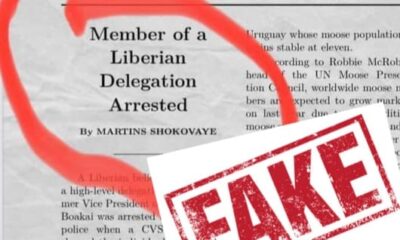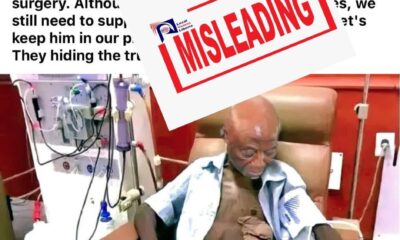Claim
ORANGE network is rewarding all old customers with 50GB free data just to say thank you for choosing ORANGE
Rating Justification
Local Voices Liberia iVerify team has fact-checked this claim and established that it is misleading.
To arrive at this, our fact-checker contacted the Orange Liberia office via phone and the Company’s management dispelled the viral claim, noting that it is a scam.
The Company, however, cautioned its customers from engaging with the senders or providing them with any personal information.
The spread of fake links is fast becoming popular in recent weeks in Liberia amidst the globalization of digital technology and the introduction of online tools and social media platforms such as Facebook, Instagram, Twitter, WhatsApp, TikTok, Snap Chart, and many others.
But there are steps that you can take to keep yourself safe and far away from being a victim of internet scammers who share fake links purporting to be offering opportunities and or free gifts.
The following simple steps will keep you on the safe side:
Step 1: The first thing to do when you come across a link whether it is in a WhatsApp group, Facebook, or in a messenger chart is to find out whether the site bearing the link is secured. That is if the link starts with “https”.
Note that most of these fake links do not start with “http”. This is a clue that the site is unsecure. This is the first thing to be wary of when you received a link from a friend or in a group chat, but remember it is not enough to tell if that link is fake or real.
Step 2: Always check the spelling in the links you receive. Many of these fake links are a copy of the original site; the creator of the fake link will copy something that looks very close to the original site of an institution, so a careful look at the link will reveal a slight misspelling of the words in the link. If you know that the link for your bank is “uniquebank.com” and you receive a link that says “uniquebannk.com”, check carefully, there is a double “n” in the fake link. This means, don’t go any further and know that it is most likely a fake link.
Step 3: The third important thing to look out for is the extra word in the link you receive from friends and loved ones. Scammers do this with the intent of convincing internet users into believing that the site is authentic. An example of an extra word link could be “orangeliberia.org.freegiftshere.com.” We at Local Voices Liberia advise that you be very careful whenever you come across links bearing things such as the example above.
Step 4: Another way to identify a fake link is to contact the business or organization that is offering a particular service. This might take about two to three days or even more, but it is better to wait and be safe than to rush and ruin your bank account or risk losing your private conversations or some very important documents. Don’t open the link, just verify using the company URL and find out whether the company is actually doing what the link says it is offering.
For example, if a link claims that Coco-Cola is giving out a free iPhone 14, check the website of Coco-Cola to see if they are actually doing a bonanza. It is only realistic for the company to place that same information about the offer on its website. But if you don’t see anything about the free gifts on the official website, know that the link is fake and it’s a scam.
Step 5: Shorten URLs can also be easily identified. To show the original link of a shortened URL, right-click on it, copy the link address, and paste it into a saved Word document than will the rightful link of the shortened URL will show up in the Word document.
This is not to say a link is fake or not but at least it shows you where the shortened URL takes you. By this, you will know whether the link is authentic or not.









